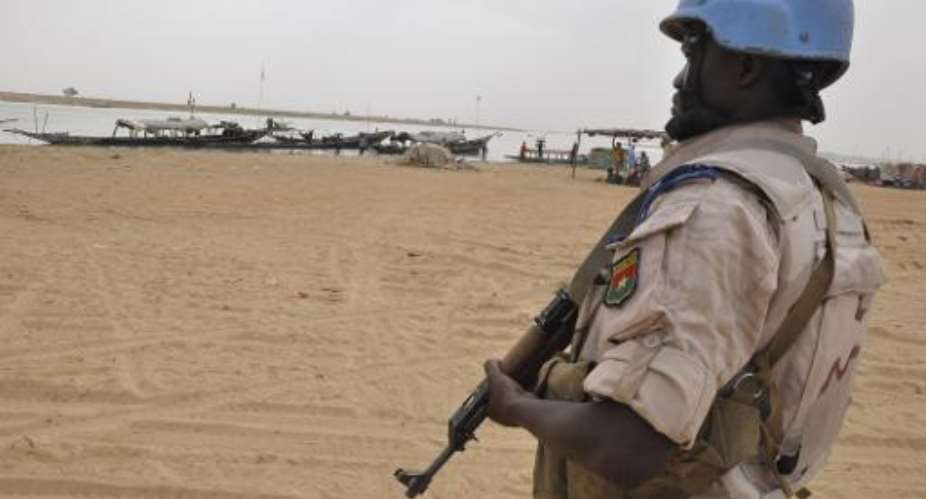BAMAKO (AFP) - Northern Mali fell under the control of Islamist groups in 2012 before they were partially pushed back in an international intervention led by France nine months later.
That response was replaced in August 2014 by the French-led Operation Barkhane, which covers a broader zone that includes the Sahel and Saharan regions of northern Africa.
Here are the key dates:
--2012--
- January 17: A major offensive by Tuareg rebels from the National Movement for the Liberation of Azawad (MNLA) and its allies is launched in northern Mali.
- March 22: In Bamako, troops led by captain Amadou Haya Sanodo overthrow the government of President Amadou Toumani Toure, accused of incompetence in the fight against Tuareg rebels and Islamists.
- March 30-April 1: Tuareg and Islamist rebels allied with Al-Qaeda in the Islamic Maghreb (AQIM) capture capitals of the three northern regions: Kidal, Gao and Timbuktu.
The MNLA is quickly sidelined however by AQIM along with its local offshoot MUJAO (the Movement for Oneness and Jihad in West Africa), and the Islamist group Ansar Dine (Defenders of the Faith).
Those groups commit multiple violent acts in the name of Islamic sharia law.
--2013--
- January 11: France launches Operation Serval to stem an advance by Islamist militants that threaten southern parts of Mali. On January 14, the militants evacuate major northern cities following French air strikes and commando operations.
- January 26 and 28: French and Malian troops retake the Islamist stronghold in Gao, northeastern Mali, and reach the centre of Timbuktu without a fight.
On January 30, French-led troops retake control of Kidal's airport and the city itself is "secured" by 1,800 Chadian troops a few days later.
- June 18: Malian authorities and Tuareg rebels in Kidal sign a ceasefire agreement that allows for a progressive deployment by the Malian army and a billeting of Tuareg fighters.
The accord leads to a presidential election that is won in August by Ibrahim Boubacar Keita.
- July 1: The UN peace mission in Mali (MINUSMA) is established.
- October 20: French, Malian and UN troops launch an operation in northern Mali to stop violent attacks by Islamist groups that erupted again in September.
-- 2014 --
- May 21: MNLA militants and Arab rebels claim control of Kidal and other northern towns after fighting with the Malian army.
Keita negotiates a ceasefire with three armed groups, including the MNLA.
- July 13: Operation Serval is replaced by Operation Barkhane, a broader offensive against Islamist fighters that mobilises 3,000 French troops in five North African countries from early August.
- July 16: Talks begin in Algiers among armed Malian groups to agree on terms of a peace agreement.
- October 3: Nine MINUSMA soldiers from Nigeria are killed during an attack in the region near Gao that is claimed by a group close to MUJAO.
-- 2015 --
- January 5: An attack claimed by AQIM kills 11 Malian soldiers in Nampala, near the border with Mauritania.
- January 29: Keita travels for the first time to the north and visits Gao where three demonstrators were killed two days earlier during protests against the presence of MINUSMA troops.
- February 1: A fifth and final round of peace talks begins in Algiers.
- March 1: The Malian government signs a peace agreement with some northern armed groups but the main Tuareg rebel alliance, the Coordination of Azawad Movements (CMA), asks for time to consult its grassroots.
- March 7: An attack against a nightclub, the first targeting Westerners in Bamako, leaves three Malians, a Frenchman and a Belgian dead. Al-Murabitoune, the jihadist group of Algerian militant Mokhtar Belmokhtar, claims responsibility.
- March 17: The CMA asks for amendments to the peace agreement, known as the "Algiers accord", but the request is rejected by the international mediation and the government.
- April 18: Algerian mediators call on all parties to sign the peace agreement on May 15 in Bamako, despite the CMA still holding out.
- April 27 to May 13: Pro-government militants seize rebel positions in the northern town of Meneka. The CMA retaliates with a series of attacks on the army resulting in numerous deaths on both sides in the most intense fighting since May 2014.
- May 14: The rebels initial the Algiers accord -- signalling their commitment in principle to the process -- but say they will not give their full signature until further negotiations have taken place.





 Lay KPMG audit report on SML-GRA contract before Parliament – Isaac Adongo tells...
Lay KPMG audit report on SML-GRA contract before Parliament – Isaac Adongo tells...
 Supervisor remanded for stabbing businessman with broken bottle and screwdriver
Supervisor remanded for stabbing businessman with broken bottle and screwdriver
 NDC watching EC and NPP closely on Returning Officer recruitment — Omane Boamah
NDC watching EC and NPP closely on Returning Officer recruitment — Omane Boamah
 Your decision to contest for president again is pathetic – Annoh-Dompreh blasts ...
Your decision to contest for president again is pathetic – Annoh-Dompreh blasts ...
 Election 2024: Security agencies ready to keep peace and secure the country — IG...
Election 2024: Security agencies ready to keep peace and secure the country — IG...
 People no longer place value in public basic schools; new uniforms, painting wil...
People no longer place value in public basic schools; new uniforms, painting wil...
 'Comedian' Paul Adom Otchere needs help – Sulemana Braimah
'Comedian' Paul Adom Otchere needs help – Sulemana Braimah
 Ejisu by-election: Only 33% of voters can be swayed by inducement — Global InfoA...
Ejisu by-election: Only 33% of voters can be swayed by inducement — Global InfoA...
 Minority will expose the beneficial owners of SML, recover funds paid to company...
Minority will expose the beneficial owners of SML, recover funds paid to company...
 Prof. Opoku-Agyemang has ‘decapitated’ the NPP’s strategies; don’t take them ser...
Prof. Opoku-Agyemang has ‘decapitated’ the NPP’s strategies; don’t take them ser...
